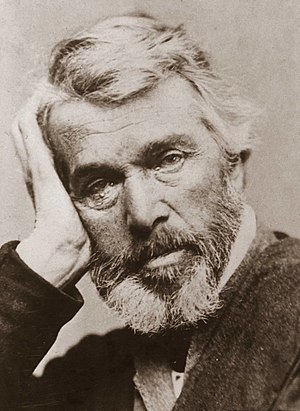“What an enormous magnifier is tradition! How a thing grows in the human memory and in the human imagination, when love, worship, and all that lies in the human heart, is there to encourage it”
Or what if this man Odin,--since a great deep soul, with the afflatus
and mysterious tide of vision and impulse rushing on him he knows
not whence, is ever an enigma, a kind of terror and wonder to
himself,--should have felt that perhaps _he_ was divine; that _he_
was some effluence of the "Wuotan," "_Movement_", Supreme Power
and Divinity, of whom to his rapt vision all Nature was the awful
Flame-image; that some effluence of Wuotan dwelt here in him! He was not
necessarily false; he was but mistaken, speaking the truest he knew. A
great soul, any sincere soul, knows not what he is,--alternates between
the highest height and the lowest depth; can, of all things, the least
measure--Himself! What others take him for, and what he guesses that he
may be; these two items strangely act on one another, help to determine
one another. With all men reverently admiring him; with his own wild
soul full of noble ardors and affections, of whirlwind chaotic darkness
and glorious new light; a divine Universe bursting all into godlike
beauty round him, and no man to whom the like ever had befallen, what
could he think himself to be? "Wuotan?" All men answered, "Wuotan!"--
And then consider what mere Time will do in such cases; how if a man
was great while living, he becomes tenfold greater when dead. What an
enormous _camera-obscura_ magnifier is Tradition! How a thing grows in
the human Memory, in the human Imagination, when love, worship and
all that lies in the human Heart, is there to encourage it. And in the
darkness, in the entire ignorance; without date or document, no book, no
Arundel-marble; only here and there some dumb monumental cairn. Why,
in thirty or forty years, were there no books, any great man would grow
_mythic_, the contemporaries who had seen him, being once all dead.
And in three hundred years, and in three thousand years--! To attempt
_theorizing_ on such matters would profit little: they are matters which
refuse to be _theoremed_ and diagramed; which Logic ought to know that
she _cannot_ speak of. Enough for us to discern, far in the uttermost
distance, some gleam as of a small real light shining in the centre of
that enormous camera-obscure image; to discern that the centre of it all
was not a madness and nothing, but a sanity and something.
This light, kindled in the great dark vortex of the Norse Mind, dark but
living, waiting only for light; this is to me the centre of the whole.
How such light will then shine out, and with wondrous thousand-fold
expansion spread itself, in forms and colors, depends not on _it_, so
much as on the National Mind recipient of it.
“Silence is more eloquent than words”
Dante does not come before
us as a large catholic mind; rather as a narrow, and even sectarian
mind: it is partly the fruit of his age and position, but partly too of
his own nature. His greatness has, in all senses, concentred itself into
fiery emphasis and depth. He is world-great not because he is worldwide,
but because he is world-deep. Through all objects he pierces as it
were down into the heart of Being. I know nothing so intense as Dante.
Consider, for example, to begin with the outermost development of his
intensity, consider how he paints. He has a great power of vision;
seizes the very type of a thing; presents that and nothing more. You
remember that first view he gets of the Hall of Dite: _red_ pinnacle,
red-hot cone of iron glowing through the dim immensity of gloom;--so
vivid, so distinct, visible at once and forever! It is as an emblem of
the whole genius of Dante. There is a brevity, an abrupt precision in
him: Tacitus is not briefer, more condensed; and then in Dante it seems
a natural condensation, spontaneous to the man. One smiting word; and
then there is silence, nothing more said. His silence is more eloquent
than words. It is strange with what a sharp decisive grace he snatches
the true likeness of a matter: cuts into the matter as with a pen of
fire. Plutus, the blustering giant, collapses at Virgil's rebuke; it
is "as the sails sink, the mast being suddenly broken." Or that poor
Brunetto Latini, with the _cotto aspetto_, "face _baked_," parched brown
and lean; and the "fiery snow" that falls on them there, a "fiery snow
without wind," slow, deliberate, never-ending! Or the lids of those
Tombs; square sarcophaguses, in that silent dim-burning Hall, each with
its Soul in torment; the lids laid open there; they are to be shut at
the Day of Judgment, through Eternity. And how Farinata rises; and how
Cavalcante falls--at hearing of his Son, and the past tense "_fue_"! The
very movements in Dante have something brief; swift, decisive, almost
military. It is of the inmost essence of his genius this sort of
painting. The fiery, swift Italian nature of the man, so silent,
passionate, with its quick abrupt movements, its silent "pale rages,"
speaks itself in these things.
